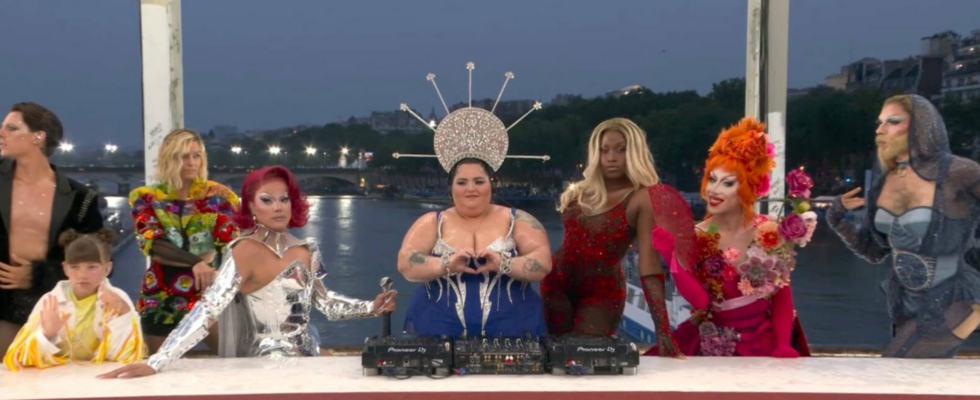Dionysus represented by Philippe Katerine, undressed and covered in blue paint, with, in the background, the participants in a banquet – including several drag queens – reminiscent of The Last Supper, the last meal of Jesus with his apostles… The sequence of the opening ceremony of the Paris Olympics, which lasted only a few minutes, continues to provoke strong reactions. On Saturday, July 27, the Conference of Bishops of France had notably deplored “scenes of derision and mockery of Christianity”. Thomas Jolly, the artistic director of the ceremony, denied the next day that he had taken inspiration from The Last Supper for this painting.
Delphine Girard, professor of classical literature and member of the Council of Elders of Secularism, saw it as a “magnificent performance” and an opportunity to reaffirm France’s attachment to secularism, one of its fundamental values.
L’Express: One of the most notable sequences of the opening ceremony has given rise to various interpretations: some see it as a representation of the Last Supper, others an allusion to the painting “The Feast of the Gods”. What is your interpretation?
Delphine Girard: I should point out that I am neither an artist nor an art historian, but, as far as I am concerned, I see an allusion to these two references: behind the very recognizable representation of Dionysus, the nod to The Last Supper seems undeniable to me. Which suggests a desire to mix references that are both pagan and Christian, specific to our dual culture, in a kind of artistic syncretism. A magnificent performance and an impudent freedom displayed in front of the world of which I am extremely proud. You would never have been able to see that in the United States, or in many other countries. Considering that art is, in some way, more sacred than religions is very specific to the French spirit.
Some Catholic representatives said they were very shocked by this scene. Does this reaction surprise you?
Yes, I was very surprised by these criticisms because it is not the first time that we have witnessed an artistic diversion of The Last Supper. The series Dr. House or that of the Simpson have, among others, referred to it in the past without it provoking such controversy! If the criticism is so virulent today, it is undoubtedly because the opening ceremony of the Olympic Games is considered a showcase for France. For my part, I am delighted to see our secular model that defends the right to blasphemy thus highlighted, despite its detractors. I admit that this development worries me, I don’t think the reactions would have been so strong thirty years ago.
Why else do you think these reactions are expressed so strongly today?
We live in a period where religious people tend to pull out all the stops when it comes to attacking secularism. I am more or less convinced that Catholic extremists are very happy with what they call this “provocation” since it gives them the opportunity, in turn, to attack our secular model. Just like Islamist extremists do. Moreover, on this issue, we can say that there is a sort of common front on their part against our republican values.
The far right has expressed its indignation, as has Jean-Luc Mélenchon. Isn’t it surprising that criticism also comes from the left?
Not from the left, but from a certain left! And no, that’s not surprising since Jean-Luc Mélenchon has made this battle his stock in trade, even if it means betraying himself and his former comrades in arms. His friends Charb, Cabu and Wolinski must be turning in their graves. The fact that the far right and the far left are seizing on this controversy concerns me because it implies that they think their electorate will follow them. Is that really the case? The simple fact that we’re asking the question is enough to scare me. I console myself by thinking about the result of this poll stating that 85% of French people found the opening ceremony of the Olympic Games a success.
Can we draw a parallel between this controversy over “The Last Supper” and what can sometimes happen in classrooms? Have you yourself been confronted with reactions from students shocked by certain artistic approaches?
Of course. We remember the Issou affair in Yvelines, where one of my colleagues was put in trouble for showing a painting of naked women in class. Shortly afterwards, I myself showed my students a short excerpt from an Arte report on Greek mythology, notably depicting the birth of Venus. Some of them covered their eyes and said: “But Madam, they are completely naked, why are you showing us that?” This reaction was not necessarily specific to very practicing Christian or Muslim students. All teachers will tell you: the ambient bigotry has taken over the youth. Even those who do not claim a particular religious confession obey a form of moral imperative and ensure that they consider it a form of respect for the sensitivities of their classmates. The political representatives who target young people, such as Jean-Luc Mélenchon, have understood this well.
.
